P2X7-dependent release of interleukin-1beta and nociception in the spinal cord following lipopolysaccharide
- PMID: 20071520
- PMCID: PMC2880485
- DOI: 10.1523/JNEUROSCI.3295-09.2010
P2X7-dependent release of interleukin-1beta and nociception in the spinal cord following lipopolysaccharide
Abstract
The cytokine interleukin-1beta (IL-1beta) released by spinal microglia in enhanced response states contributes significantly to neuronal mechanisms of chronic pain. Here we examine the involvement of the purinergic P2X7 receptor in the release of IL-1beta following activation of Toll-like receptor-4 (TLR4) in the dorsal horn, which is associated with nociceptive behavior and microglial activation. We observed that lipopolysaccharide (LPS)-induced release of IL-1beta was prevented by pharmacological inhibition of the P2X7 receptor with A-438079, and was absent in spinal cord slices taken from P2X7 knock-out mice. Application of ATP did not evoke release of IL-1beta from the dorsal horn unless preceded by an LPS priming stimulus, and this release was dependent on P2X7 receptor activation. Extensive phosphorylation of p38 MAPK in microglial cells in the dorsal horn was found to correlate with IL-1beta secretion following both LPS and ATP. In behavioral studies, intrathecal injection of LPS in the lumbar spinal cord produced mechanical hyperalgesia in rat hindpaws, which was attenuated by concomitant injections of either a nonspecific (oxidized ATP) or a specific (A-438079) P2X7 antagonist. In addition, LPS-induced hypersensitivity was observed in wild-type but not P2X7 knock-out mice. These data suggest a critical role for the P2X7 receptor in the enhanced nociceptive transmission associated with microglial activation and secretion of IL-1beta in the dorsal horn. We suggest that CNS-penetrant P2X7 receptor antagonists, by targeting microglia in pain-enhanced response states, may be beneficial for the treatment of persistent pain.
Figures
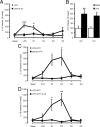
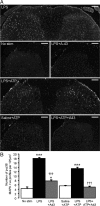
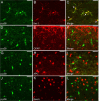
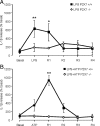

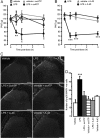

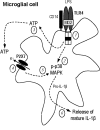
References
-
- Abulafia DP, de Rivero Vaccari JP, Lozano JD, Lotocki G, Keane RW, Dietrich WD. Inhibition of the inflammasome complex reduces the inflammatory response after thromboembolic stroke in mice. J Cereb Blood Flow Metab. 2009;29:534–544. - PubMed
-
- Baldassare JJ, Bi Y, Bellone CJ. The role of p38 mitogen-activated protein kinase in IL-1{beta} transcription. J Immunol. 1999;162:5367–5373. - PubMed
Publication types
MeSH terms
Substances
Grants and funding
LinkOut - more resources
Full Text Sources
Other Literature Sources
